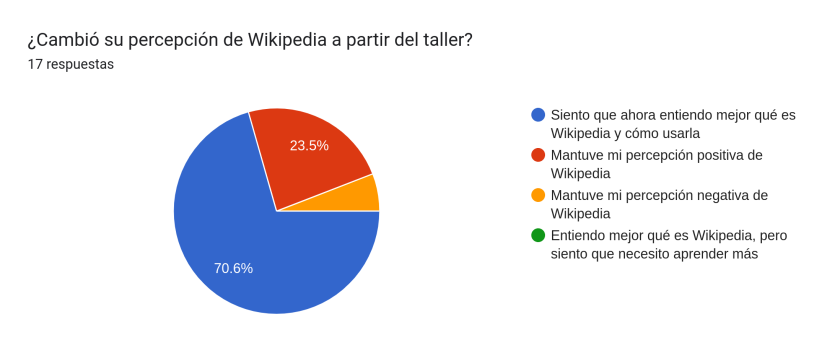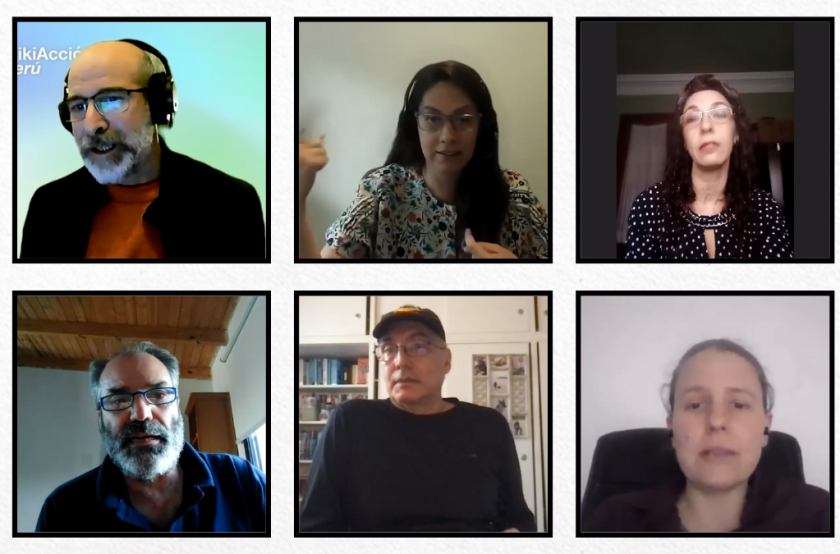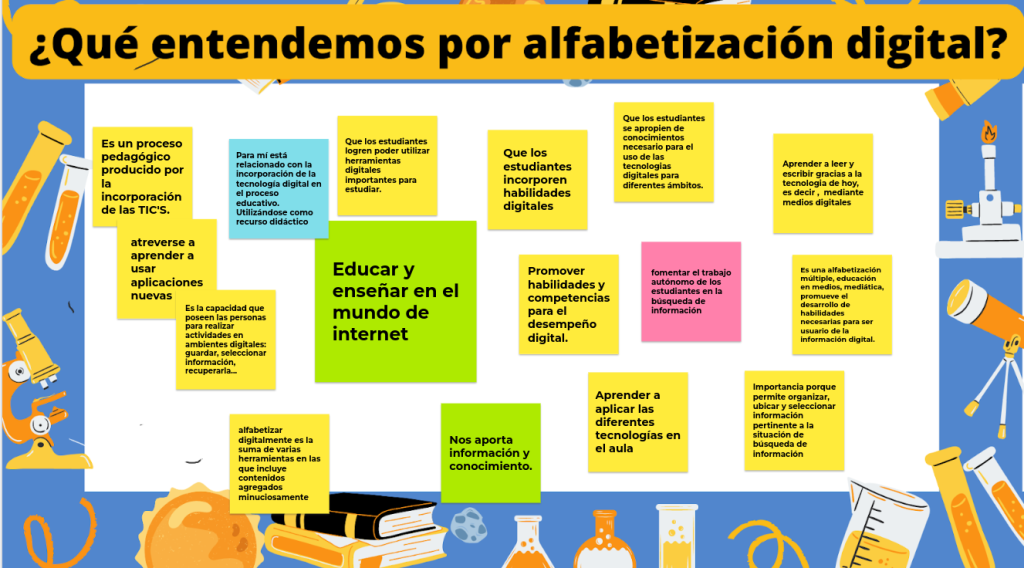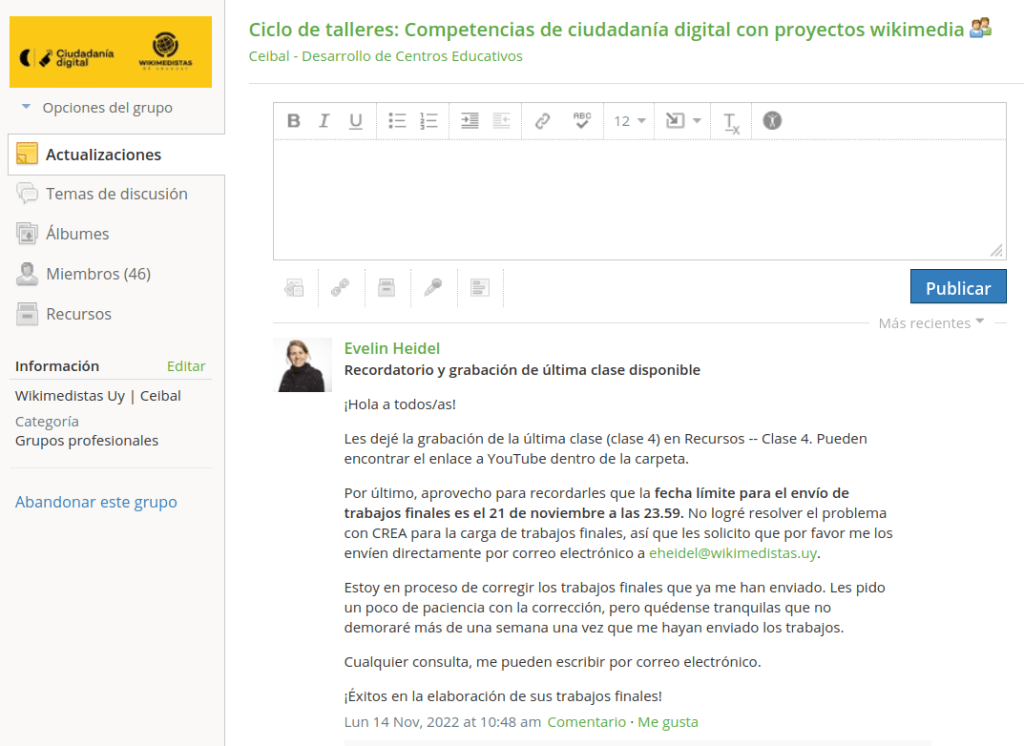Uruguay is acknowledged by the International Educational Sector for one of the most ambitious informational literacy programs and digital citizenship: Ceibal, an acronym for Conectividad Educativa de Informática Básica para el Aprendizaje en Línea (Basic Computing Education Connectivity for Online Learning).
This program was created in 2007, during the presidency of Tabaré Vázquez. In its beginnings, Ceibal sought to close the digital gap by providing a computer to every student in the country, following a model from One Laptop Per Child. Over time, Ceibal’s goals evolved and it became the “center for educational innovation with digital technologies of the Uruguayan State”. Therefore, many of their tasks include working directly with teachers so they can bring technology into the classroom in a meaningful way for their students.
For this end, Ceibal often encourages private and civil society organizations, which are experienced leaders carrying out relevant digital projects, to offer new training opportunities for teachers. In this framework, Wikimedistas de Uruguay was invited by Ceibal’s Department of Citizenship and Digital Welfare in 2021 to give a talk and a workshop in the IV Digital Citizenship Conference. This workshop was the beginning of a successful partnership between Wikimedistas de Uruguay and Ceibal’s Department of Citizenship and Digital Welfare.
A Talk, a Workshop, How Can I Do It?
Wikimedistas de Uruguay is a group of people who have been giving classes and workshops on topics related to free knowledge for many years. Yet, this was the first time we were giving a workshop for such a special audience: elementary and highschool teachers. We needed help to better understand what features of Wikipedia would be more relevant for their work to focus the training on them.
This is why we turned to the true specialist, Melissa Guadalupe Huertas, from the Wikimedia Foundation Education Team. As some of you may know, Melissa was behind the execution of the program Reading Wikipedia in the Classroom, and I thought she could give us a hand.
And so it was: Melissa shared with us a series of resources, including a slideshow she had once made for another workshop. The outline of Melissa’s workshop was clear: to make them reflect upon their own concept of “informational literacy” by using Google Jamboard and linking those ideas to Wikipedia.

One Premise: Do Not Edit
Our priorities to discuss with Melissa about the workshop were clear:
- It had to be a workshop, we meant to provide a space for practice and consideration activities.
- The workshop had to function as an introduction to Wikipedia, but it couldn’t be just a presentation or a master class.
- Even though it was a workshop, we were not going to edit. We had no time and it was more important to us that attendees take away with them some solid grasps.
With this in mind, we adjusted Melissa’s slideshow to the local context and added some elements to ease the interaction:
- We used Mentimeter (a live online survey tool) with questions about their experience and thoughts around Wikipedia.
- We prepared one last activity where they had to read an article from Wikipedia, partly inspired by the exercises we found in the workbook from Reading Wikipedia in the Classroom.
Using too many applications (Jamboard, Mentimeter, Google Docs) in a workshop can be risky, people might get lost while switching tools; perhaps they don’t have good connectivity or the skills to change between tools easily. That’s why, at all times during the workshop, we reminded people that if they weren’t able to participate, they could open their microphones to share their experiences or, if preferred, write through the Zoom chat.
This gave people the opportunity to open their microphones and share, but to do so in a predefined space: it was not an open question, if they wanted to open their microphone, they shall do it by answering the query. This helped to avoid things getting out of control, like everyone talking at the same time without a clear answer.

This last activity was a reading exercise of a Google doc with about 10 preselected articles by us around relevant topics for the country, including some tasty notes such as the article for chivito, a typical food from Uruguay, which opened the possibility to analyze Wikipedia with a dose of humor. The task was simple: to write in a Google Doc one good feature and a bad one in their opinion from the articles they decided to read.
As a closing activity, reading an article from Wikipedia allowed the attendees to put their newly acquired knowledge about references and neutrality into practice, and to analyze the information gaps. At the end of the exercise, we asked through Mentimeter if there was a change in their perception of Wikipedia after the workshop. Most of them reported a change of perception. After the workshop, people were able to access all the resources showcased, such as slides, Reading Wikipedia workbook in Spanish, and many more.
The collaboration with Ceibal for this workshop was a great motivation to apply for an annual grant from the Wikimedia Foundation. As a User Group, we’re always happy to receive funds to carry out activities to engage our closest community. Ceibal’s invitation showed us there was an audience ready to learn how to interact efficiently with Wikipedia.
From a Workshop to a Series of Workshops
After this experience, Ceibal kept inviting us to run activities; they included our workshop for the Summer School 2022. We also sent them a proposal for a series of workshops about Wikipedia to Ceibal’s vendor registry. This allowed the funding of all the workshops by an institution other than Wikimedia Foundation.
The decision to experiment with a series of workshops was ambitious. it meant to develop a more elaborate and complete program rather than a half an hour slideshow for a workshop. In January we submitted the proposal with the four modules we’ll be teaching during the workshop. It will also include a brief introduction to Wikimedia Commons.

At the end of the workshop, it was clear that in order to create value, the proposal must go beyond merely giving a series of workshops. When the attendees completed the program, they must have a full action plan to follow up to actually bring these activities to the classroom. To this end, we included a final activity consisting of reflecting about their own experience and suggesting an activity to bring back to the classroom.
The series of workshops comprised four modules:
- Workshop 1: Introduction to Wikipedia and Wikimedia Projects. Exchange of concepts and definitions about digital literacy. The relevance of Wikipedia for digital literacy. What is Wikipedia? How Wikipedia works: the five pillars. Reliable sources. Wikipedia’s geographic and gender biases. Wikipedia’s trustworthiness. Exercise: critical reading of an article from Wikipedia.
- Workshop 2: Introduction to Wikimedia Commons. Introducción a los Recursos Educativos Abiertos en el contexto de Wikimedia Commons. Características de la confiabilidad e información presente en Wikimedia Commons. Ejercicio: búsqueda de imágenes en Wikimedia Commons. La relevancia de Wikimedia Commons para contribuir al conocimiento local y global. Introduction to Open Educational Resources in the context of Wikimedia Commons.
- Workshop 3: Editing basics. Editing Wikipedia. Exercise: Neutrality test and lead paragraph. Deepening into the concept of reliable sources. Practical demonstration of how to add a sentence or paragraph, a reference and an internal link in Wikipedia.
- Workshop 4: Introduction to Wikidata. Introduction to Wikidata. Connection between Wikidata and semantic web. Editing Wikimedia Commons. Final work presentations.
- Discussion (optional): Experiences from Wikimedia Movement. Discussion with volunteers from Wikimedia Movements. This activity was recorded on YouTube and our main goal was to put a face on the people who build Wikipedia and other Wikimedia Projects.
In this folder you will find all the resources used during the workshops.

Takeaways
Overall, we had a positive outcome from this activity. We want to share some of our takeaways:
- The first workshop started in the frame of the IV Digital Citizenship Conference and continued with Summer School. Both were great leads to think about a more ambitious plan.
- Adapting schedules according to teachers’ availability is important. One of our sessions didn’t have the same attendance due timing.
- Offering a space to discuss their work helped more people to finish the last activity.
- Assessments and follow ups are necessary to better understand which are the barriers to implement final projects once they’re written.
- Although we had interactive activities in all the workshops, in some cases we have to rethink the format and the order of the modules.
- It was very useful to take the training of Reading Wikipedia in the Classroom offered by Wikimedia Foundation. This allowed us to better understand the local educational context.
- To put a face on the people from the movement through the discussiòn and pictures in the slideshow was very useful.
¿How’s Our Work Progressing?
Thanks to the work done during 2022, we were summoned up to participate in the Summer School 2023, where we filed again a proposal for a series of workshops to Ceibal’s vendor registry. We continued exploring several ways to collaborate with Ceibal’s Citizenship and Digital Welfare Team, and most of all, to improve the multiple ways to teach how Wikipedia and Wikimedia Projects can be used in education.

Can you help us translate this article?
In order for this article to reach as many people as possible we would like your help. Can you translate this article to get the message out?
Start translation
